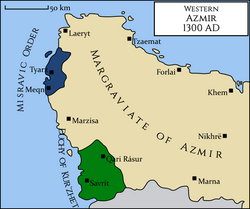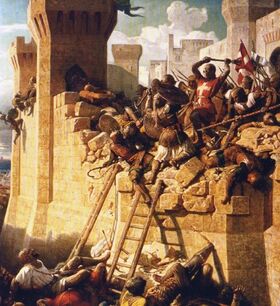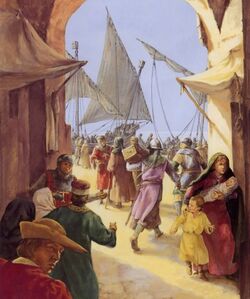Fall of Tyarz: Difference between revisions
(Created page with "{{Infobox military conflict |conflict= Fall of Tyarz |partof= the Azmiri Crusade |image= 280px |caption= Cadenzan and Exponential crusaders def...") |
m (1 revision imported) |
Revision as of 18:48, 28 January 2019
The Fall of Tyarz took place in September 1301 and was a defining moment in west Ethlorek history, with long-lasting repercussions throughout Azmir, Cadenza and Kur'zhet. Despite the impressive fortifications of the city, Tyarz fell in a matter of months to a large force commanded by the Marquis of Azmir. It was the worst defeat of the Knights of Saint Misrav in over fifty years, and a sense of general ire led the Order Master of Azmir, Saleb Resis, to launch a retaliatory attack from his new headquarters at Meqn. Over the following months and years, this campaign evolved into the forty year-long Azmiri Crusade.
Background

The Knights of Saint Misrav arrived in Azmir in 1178, at the request of the Siresian abbot of Meqn. This was the oldest surviving Christian monastery in Azmir, and the largest centre of Siresian activity outside Cadenza and Kur'zhet. As the Azmiri rulers at Khem exerted their power more through the 12th and 13th centuries, they put increasing pressure on Christian missionaries and at times threatened their churches and monasteries with violence. The Knights almost immediately turned back these attacks, building a substantial presence in Meqn and its hinterland. In 1211 they established their territorial headquarters at Tyarz, some distance up the coast, and established a pale reaching inland and received official sanction and support from the government of the republic.
Defences
Already an important port, Tyarz under the Knights grew to become Azmir's second city, surpassing Forlai and Kur'zheti Savrit. A new wall was constructed to ring the city in 1238, financed by a combination of harbour dues and funds from the republic's treasury. This wall, 5 metres (16 ft) thick, was interspersed with towers atop which catapults and ballistae were to be mounted. Tyarz was separated from its port by a thinner section of wall, in which was set a single gate. In 1246, work began on a citadel overlooking the harbour, which was protected from the landward side by a spur of the wall extending a little beyond the city proper. The citadel boasted walls 8 metres (26 ft) thick and a keep with its own portcullis and drawbridge. Outside the city wall was a dry fosse, 4 metres (13 ft) in depth and traversed by a wooden bridge leading to the formidable gatehouse. This network of fortifications was, at the time, the most comprehensive of any Ethlorek city south of Jajich, and it was generally regarded as being unassailable.
Decline of the Knights' presence
Towards the end of the 13th century, as Cadenza's conflict with Kur'zhet escalated once again, the Knights found themselves scaling back their presence in Azmir. Tyarz remained a key port, not only for its economic prosperity but also as a base to attack Kur'zheti ports and ships, but the numbers garrisoned in the city diminished slowly from 1260 onward. As a consequence of this, the borders of the Cadenzan landholdings in Azmir retracted, with the northern frontier settling halfway between Tyarz and Laeryt.
Despite this decline, Tyarz remained a hub of crusading activity. In 1289 it became host to a chapter of the Order of the Dragon, who garrisoned six hundred men in the city, and in 1292 the Cadenzan earls sent a further twelve hundred soldiers to supplement the diminished Knights' presence.
Prelude
It was against this backdrop of a waning crusader hold over the region that the Kur'zheti governor of Savrit, in early April 1301, approached Marquis Periax II and offered him "the keys to ancient Meqn and gold-roofed Tyarz, free indeed for any man's taking". Surprised but intrigued, Periax demanded to know what the governor meant, and on learning of the weakened garrison at Tyarz decided to assemble an army to besiege the fortress.

